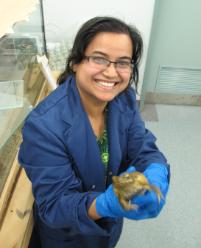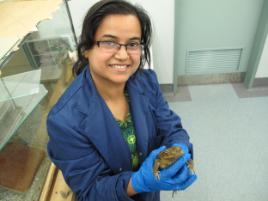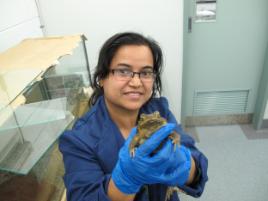Khurshida's long winding toad study has sharp focus
Published on 09 September, 2009
Khurshida Siddiqua has come a long way since she studied for her Masters degree in Bangladesh.
She's had 2 children, moved to New Zealand and then Melbourne and now Gladstone, and has enrolled for doctoral research involving frogs and toads. Meanwhile, her husband has adapted his work patterns from full-time to part-time so she has time to concentrate on her research.
LINK here to see a video on Khurshida's toad research

Khurshida with one of her research subjects
Khurshida explains that her study into the effects of herbicide (in this case the commonly used atrazine type) on amphibians has a unique perspective because most studies focus on immediate effects.
In this case, the study seeks to understand how the effects are passed to subsequent generations of animals via genetic changes.
For example, if one generation experiences disruption to its reproductive capacity or endocrine (hormones/glands) system, does this appear in subsequent generations?
"It is well documented that amphibians can play a role in early detection of environmental changes," Khurshida said.
"We are going to conduct the research to assess the generation-wise effects of atrazine through different life-cycle stages in successive generations and also to ascertain whether larval cane toads can be used as a surrogate test species for local frog species, so that the use of native frogs in laboratory toxicity tests can be reduced.
"We also seek to find out whether atrazine can cause retardation of sexual development or any sex reversal."
Khurshida has chosen toads (with frogs as a comparison) because of their rapid succession of generations. Hence, she will introduce the common herbicide 'atrazine' at the egg, tadpole and adult stages and then trace its generational influences.
"Hopefully I can follow at least 2 generations after the introduction of the herbicide," she said.
Khurshida is pleased she was able to win a university scholarship to enable her to pursue her research, which is supervised by Dr Scott Wilson and Dr Ralph Alquezar at the Centre for Environmental Management.
"I believe my research outcome will be really useful in developing policies and management actions for the benefit of amphibians as well as for other animals, ultimately for our own good," she said.



